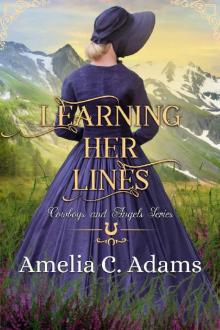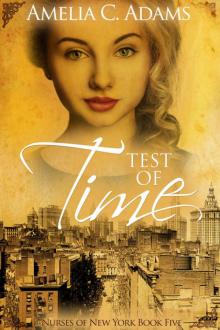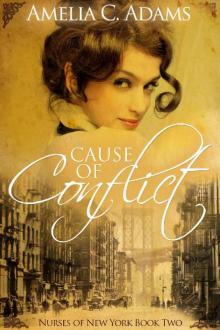- Home
- Amelia C. Adams
Learning Her Lines Page 2
Learning Her Lines Read online
Page 2
“If I were to pretend to believe you, what would we do next?” he asked slowly.
“We would move on to solving your problem, which is, of course, the fact that your director just left. The solution, of course, is for you to direct the play yourself.”
Melvin shook his head. “Now I know you can’t possibly be real. I have no experience directing—I’m a businessman. I own the theater because it’s a good potential source of income.”
“Oh? Is that what you think? Now who’s not being real?” Mrs. Van Dyke shook a finger at him. “You don’t merely own a theater because you think it’s good business—you own it because it speaks to your soul, and that’s how it rightfully should be. The arts, Mr. Westcott, celebrate beauty, and that’s why your predicament has caught our attention. We need more light and humor and moments of joy in this world. People need the chance to break away from their toils and have a moment to laugh or to cry healing tears. The purpose of life isn’t facing the everyday monotony—it’s finding joy in the cracks and crevices, and that’s what the arts can do for us.”
Melvin shifted in his chair, feeling uncomfortable and wondering how she’d managed to articulate things he’d felt for a long time, but had never condensed into such a neat packet. “You’ve summed that up beautifully, Mrs. Van Dyke, but that doesn’t change the most salient fact, which is that I’ve never directed anything. I hire other people to do the things I can’t do myself, and that’s one of them.”
“You haven’t directed before, but that doesn’t mean you can’t.” She looked at him pointedly. “I intend to help you every step of the way. We’ll see this through together.”
“You’re . . . going to help me?”
She gave him an exasperated look. “Of course I am. It would be rather mean of me to show up, give you a seemingly impossible task, and then leave you to do it alone.”
The only explanation for this entire conversation was that this woman had somehow heard the director was leaving and came to petition for the job, calling herself an angel to get her foot in the door. But getting her foot in the door was the entire question—how had she gotten into his locked office? There must be a key he didn’t know about, or a loose window, or a secret passageway. Something like that.
“And how does it work, Mrs. Van Dyke? You help me direct this play, I pay you, and then what? Do you leave town or insist on directing the next play, or is there a third alternative I haven’t considered?”
“What? Why, I never!” She sat up straighter. “Mr. Westcott, I’m not here to ask for money or a job. I’m here to guide you as you seek to better the community. I must say, I’m starting to doubt this entire assignment. I understand that you’d be suspicious at first, but by now, you really should be coming around.” She stood up, tucking her reticule under her arm. “I’ll take my leave and come back later. Hopefully by then, you’ll have overcome your squeamishness and we can get to work. I meant what I said—we really don’t have time for this.”
“I’m not sure you should come back,” Melvin said. “I still have no idea who you are, and I don’t know how you got into my office—which was locked. You accessed it through illegal means. Of course I doubt you on that score alone.”
She gave him an indulgent look. “Mr. Westcott, things like locked doors simply don’t matter to me. I don’t move about like most people do—it would take me forever to get from place to place.”
“And so how do you move about?” If she could give him a straight answer just once, it would be a welcome relief.
“I’m not sure how to describe it. Someone once told me that I ‘poof,’ but since I can’t see myself, I don’t know if that’s accurate.”
“You poof? What does that even mean?”
“It’s sort of a . . . here-one-minute and then gone-the-next sort of thing.”
Stranger and stranger. “Could you show me?”
“Mr. Westcott, I will not make myself into a spectacle just to prove that I am who I say I am.” She turned toward the door. “I’ll be back later this afternoon—or maybe I won’t. I must evaluate this situation and decide if I really should invest myself in your cause. So far, you’ve proven to be completely disappointing.” She stepped into the hallway and closed the door behind her with a click.
“Wait, Mrs. Van Dyke,” Melvin called out. He moved from behind his desk and opened the door, looking out into the corridor. He saw no one but Alice, the young woman who took care of the costumes and did countless other tasks around the theater. “Where did she go?”
Alice looked up from the tableful of scripts she was sorting. “Who, Mr. Westcott?”
“The woman who just left my office not ten seconds ago.”
Alice shook her head. “No one left your office, sir. I’ve been out here a good fifteen minutes and haven’t seen a soul.”
Melvin blinked a few times. “All right. Thank you.”
He was left with a few options, the first being that Alice had simply missed Mrs. Van Dyke. As soon as he had the thought, he dismissed it. The woman would have passed right by the table where Alice was working, and with those voluminous skirts in that unusual color, she couldn’t have escaped notice. The next option was that Mrs. Van Dyke had left using the same secret passage she’d used to enter his office in the first place, but that sounded like a dime novel and not a real-life scenario. Besides, she’d left his office through the door, and if there was a secret passage, it would have to originate inside his office, not outside.
The last alternative, and the one that was beginning to make the most sense, was that he’d completely lost his mind and imagined the whole thing.
“Alice,” he said, turning back to the girl, “do you find me a reasonable man?”
“Yes, sir. I’ve never considered you unreasonable.”
“And what about the other employees, and the actors and actresses? Have you ever heard them express concerns about me?”
Alice put down the script she was holding and gave him her full attention. “What’s the matter, Mr. Westcott? You seem extraordinarily troubled by something.”
“It’s nothing, really—except perhaps I’m wondering if I’ve lost my mind.”
“Actually lost your mind, sir, or do you mean that you’re flustered today?”
“I’m definitely flustered, but I do mean, actually lost my mind. Have you detected any signs of senility in me?”
She chuckled. “If you don’t count sinking your life savings into a theater in the middle of a mining town . . .”
“Yes, yes, that was definitely a risk. I mean other things. Do I . . .” He leaned forward. “Do I ever talk to things that aren’t there?”
“You talk to yourself on a regular basis, sir. You might even talk to yourself more than you talk to other people.”
“Sadly, yes, I know of that failing.”
“Would . . . would you like me to send for Dr. Thomas? You seem rather agitated.”
He waved a hand. “No, no, I’m sure I’m fine. I likely just need a good night’s sleep or a brisk walk in the fresh air. Thank you, Alice. I’m sorry for interrupting your work.”
“That’s all right …” She was still looking at him quizzically. “Maybe a glass of water?”
“No, but thank you.” He didn’t think water was a medically recognized cure for senility. “I’ll be in my office if you need me for anything. Oh—and I should let you know that we’ve lost our director. I’ll be placing an ad to see if we can locate another.”
“I’m sorry to hear that, sir.”
“I suppose we’ll get it all figured out. Eventually.”
Alice gave him a nod, and he went back into his room and closed the door.
Angels. What a laughable idea. He sat down behind his desk once more and replayed that odd conversation. He’d read the Bible—he knew the story of the Angel Gabriel, for instance, who had come to speak with Mary about her impending pregnancy. But that was something entirely different—that had to do with the birth of the Son of G
od, not the running of a theater. If angels did still pay visits to mankind, why would they visit people with such inconsequential problems? Directing this play was so unimportant compared to the salvation of mankind. It seemed sacrilegious to think that he had somehow merited heavenly help.
He leaned back in his chair and closed his eyes, thinking about all the events of the day. Mr. Alfred Bloomberg, former director of the Creede Theater, had certainly created a fine kettle of fish. Of course he was only thinking about advancing his career and hadn’t set out to hurt Melvin in any way, but the results were the same regardless of the intent. And now Melvin was having hallucinations from the stress of it.
A light tap on the door made Melvin open his eyes. “Come in,” he called, and Alice stepped into the room.
“I’m sorry to trouble you, sir, but Willie Meeks is here to see you,” she said.
“Willie? Send him in,” Melvin replied. Willie was a young man often hired by the people in town to run errands for them, and was also the stepson of Dr. Thomas. Melvin wondered if that was entirely coincidental or if this was a sign that yes, he should be seeking medical attention. But signs came from above, didn’t they? And that was yet another coincidence—receiving signs from above about personages who may or may not also be from above . . . His headache was getting worse.
“Mr. Westcott?” Willie stuck his head in the office, and Melvin waved him in. The boy crossed the floor and handed over an envelope. “This was left at the general store with instructions that it should be delivered to you this afternoon, and not a moment sooner. Mrs. Jackson asked me to bring it over. I hope I waited long enough.” He paused. “And I hope I didn’t wait too long.”
Melvin didn’t like the sound of letters that had to be delivered at certain times. He recalled another letter he’d received that morning. “You did well.” He pulled a coin from his pocket and handed it to the boy, who thanked him and then ducked out of the office as humbly as he’d entered.
The writing on the outside of this envelope was decidedly feminine, and he didn’t recognize it. He didn’t often get letters from ladies. As he unfolded the sheet, however, he did recognize the perfume, and reading the letter confirmed his guess.
Mr. Westcott,
Thank you for the opportunity of starring in your new play, but I’ve accepted Alfred’s proposal of marriage, and I’m on my way to San Francisco with him right now. We realize that the manner of our leaving puts you in a dreadful bind, which is why we snuck out like cowards—we feared that if you asked us to stay, we would, and then we’d never realize Alfred’s dreams in California. We wish you the best in all you do.
Mabel White
“Alice!” Melvin bellowed, slamming the page down on his desk.
The girl darted back into the room. “Yes? What’s the matter?”
“Did you know anything about this?”
She looked confused. “About what, sir?”
“Miss White eloped with Mr. Bloomberg!”
“She did?” Alice looked startled, but then she smiled. “I did wonder if there was an attraction there. They seemed to enjoy spending time together, but I didn’t know anything about an elopement, sir.”
“In the future, if you see two people in this theater showing any interest in each other at all beyond just their regular day-to-day business, I want you to tell me immediately. I’ve been completely blindsided by this event, and now I don’t even know if we can proceed with the play. No, I’m quite sure we can’t. We’ve lost the director, we’ve lost the female star—this is disastrous. Why couldn’t they have waited until after the conclusion of the play?”
“I wish I had answers for you, sir. You’ve had quite a frustrating day. Perhaps you should go home early? We won’t be having rehearsals tonight, obviously, without a director and a star. You could get some sleep and feel much more refreshed in the morning.”
Going home early . . . When was the last time he’d done such a thing? He honestly couldn’t recall. “I believe you’re right, Alice. I should go home and get some rest. Then I’ll be able to think more clearly. Would you please send a note around and tell everyone to meet here at the theater at ten in the morning? I know it’s earlier than usual, but we’ll need to discuss . . . well, whatever decisions I make tonight.”
“I’ll take care of it, sir.”
“Thank you.” Melvin gathered up his things and took extra care to lock his office—not that it had done him any good before. Then he made his way through the streets to the small house he was renting from Mr. Wendell Thurgood. He had intended to buy it once the theater was more profitable, but now it seemed that plan was on hold. Without a play, there were no profits.
He stepped into the house and put his hat on the nail behind the door, then turned around and winced. “Good gracious, Mrs. Van Dyke. How in the world did you get inside my house?”
Chapter Two
Claudia Van Dyke looked up benignly from the rocking chair in front of the fireplace. “The same way I got into your office, of course. I poofed, as they say.”
Melvin shook his head, feeling his nerves fray even more. “I must insist that you leave. Do I need to call the marshal?”
“Oh, there’s no need for that. I’m sure we can work out our little disagreements between the two of us.” She motioned toward the other chair near the hearth. “Come join me. I have some coffee brewing—it will be ready in a few minutes.”
Melvin took the chair, not because he was interested in having a heart-to-heart conversation, but because he didn’t think he could remain standing any longer. Being senile was exhausting business.
Mrs. Van Dyke leaned forward and patted Melvin’s knee in a very grandmotherly sort of way. “I know Miss White’s news was unsettling, but the solution is actually much simpler than you think. Just this day—”
“Wait. You know about Miss White?”
Mrs. Van Dyke blinked. “Of course I do. I know everything having to do with your situation. That’s what happens when an angel accepts an assignment—they are given all the information they’ll need to complete that assignment to the best of their abilities. I didn’t know about it until you received the letter, however. Otherwise, I would have brought it up with you sooner.”
“At least you’re not keeping things from me,” Melvin grumbled. “All right, what am I supposed to do now?”
“I realize you’re only asking that question out of frustration and not because you’re ready to listen to me or pay heed to my counsel.” She settled back in her chair and folded her hands on her lap. “However, regardless of your begrudging reasons for the request, I shall answer. You already know half of your solution—you should direct the play yourself.”
Melvin sighed. “I’d hoped you’d changed your mind since I saw you last.”
She looked amused. “My dear boy, that was such a short time ago, and I need much longer than that if I’m going to change my mind about something. No, you’re the right director for the job, and the sooner you realize that, the better off we’ll all be. We’ve established, haven’t we, that time is of the essence?”
He nodded.
“Good. I’m glad that one bit of wisdom managed to sink into your mortal mind. As far as the other solution, it’s right in front of your face and has been for some time.”
“It has?”
“Yes. In fact, it was there in front of you this afternoon, and you didn’t even realize it. Of course, you didn’t know you had this particular problem until afterwards, but time is such a strange thing, isn’t it?”
“I’m sure a great many things happened to me today that I didn’t recognize for what they were,” Melvin replied dryly. “I’ve been busy and preoccupied.”
Mrs. Van Dyke looked melancholy. “Yes, and that is the sad, sad state of most of the world. Everyone’s so busy and preoccupied that they miss the subtleties of life, the little miracles that happen every day, the blessings they enjoy. If they all slowed down and paid attention to the things going on around th
em, I think they’d be quite startled to realize just how very blessed they are, just how many things do work out for the good every day.”
Melvin pulled in a breath. “Mrs. Van Dyke, I don’t disagree with you in the slightest on that point, but we still have some things to discuss. Such as the fact that I don’t believe you’re an angel.”
“Are we really going to go around and around and around like this all day? Let me ask you this, Mr. Westcott. Let’s say you decide to take my advice, and we work together to save your play. Then you discover that I’m actually not an angel. Where’s the harm in that? I haven’t hurt you in any way—in fact, I’ve helped you. If I’m offering good advice, does it matter who I am?”
“I just don’t think I’d feel comfortable taking advice from someone who might be lying to me.” He figured he didn’t have anything to lose by being completely straightforward with her. “After all, you do keep breaking in where you don’t belong—first my office, now my home.”
“And you enjoy beating dead horses, don’t you?” She stood up. “Mr. Westcott, here’s what I propose. Get a good night’s sleep. Meet with your cast and crew to hash out whatever it is that needs to be hashed out. I’ll return to visit with you tomorrow afternoon, and we can discuss it then.” She lifted her finger and shook it at him. “Keep your eyes open, young man, and don’t shut yourself off from the possibilities. They’re all around you—but you must be mindful of them.”
Melvin wanted to reply, but she’d whisked herself off through the door before he could form the words. How exasperating.
At least she’d started some coffee. He poured himself a cup and settled in by the fireplace to drink it while he thought over his options. He didn’t seem to have many, and that was troubling.
A theater in a place like Creede was a risk, just as Alice had said, because it was a novelty. But it was the novelty of it that made it a good investment . . . or so he’d thought. Now here he was in the middle of a mining town with very few resources and no one to call in as a backup director. As much as he disliked the thought, he would need to step in and do it himself if the show was to be produced after all. He could muster up the leadership skills—he wasn’t a stranger to taking charge. He’d place an ad in the newspaper in the morning, and if he didn’t receive a reply, he’d do it.

 Honoring Her Heart
Honoring Her Heart Buttons and Bows
Buttons and Bows An Agent for Emily
An Agent for Emily Christmas Catch-Up VIII (River's End Ranch)
Christmas Catch-Up VIII (River's End Ranch) A Rancher for Rowena
A Rancher for Rowena Candice (Seven Sisters Book 6)
Candice (Seven Sisters Book 6) Butterfly Kisses
Butterfly Kisses A Stitch in Time
A Stitch in Time Buttons and Bows (The Sewing Circle Book 3)
Buttons and Bows (The Sewing Circle Book 3) Sidearms and Songbirds (Hearts of Nashville Book 3)
Sidearms and Songbirds (Hearts of Nashville Book 3) Herd to Breathe
Herd to Breathe The Ties That Bind
The Ties That Bind Rhyme or Reason
Rhyme or Reason Revelations (Brody Hotel Book 4)
Revelations (Brody Hotel Book 4) Phoebe's Fate (Burnt River Contemporary Western Romance Book 9)
Phoebe's Fate (Burnt River Contemporary Western Romance Book 9) And Something Blue (Main Street Merchants Book 1)
And Something Blue (Main Street Merchants Book 1) Learning Her Lines
Learning Her Lines Connections
Connections The Turn of a Wheel (Kansas Crossroads Book 17)
The Turn of a Wheel (Kansas Crossroads Book 17) Just Desserts (Main Street Merchants Book 4)
Just Desserts (Main Street Merchants Book 4) An Agent for Anna
An Agent for Anna An Agent for Esme
An Agent for Esme A Handyman for Helen
A Handyman for Helen Scented Sensibility
Scented Sensibility Addie's Adventurer
Addie's Adventurer Defying the Darkness
Defying the Darkness Riding the Rails
Riding the Rails Sugar And Spice (Main Street Merchants Book 7)
Sugar And Spice (Main Street Merchants Book 7) An Agent for Cynthia
An Agent for Cynthia In The Stars (Main Street Merchants Book 6)
In The Stars (Main Street Merchants Book 6) Moonlight With Alice (The Matchmaker's Ball Book 3)
Moonlight With Alice (The Matchmaker's Ball Book 3) Five Golden Rings (Main Street Merchants Book 3)
Five Golden Rings (Main Street Merchants Book 3) Between The Lines (Main Street Merchants Book 5)
Between The Lines (Main Street Merchants Book 5) An Agent for Lucy
An Agent for Lucy Jessica (Seven Sisters Book 2)
Jessica (Seven Sisters Book 2) A Passing Glance
A Passing Glance Pet Peeves
Pet Peeves RNWMP: Bride for Joel
RNWMP: Bride for Joel Bowing to Betsy (The Matchmaker's Ball Book 11)
Bowing to Betsy (The Matchmaker's Ball Book 11) Rebekah (Seven Sisters Book 4)
Rebekah (Seven Sisters Book 4) A Joyful Noise (Kansas Crossroads Book 14)
A Joyful Noise (Kansas Crossroads Book 14) Her Second Chance Hometown Groom
Her Second Chance Hometown Groom A Christmas Promise (Kansas Crossroads Book 16)
A Christmas Promise (Kansas Crossroads Book 16) Bride for Samuel
Bride for Samuel Bribing the Blacksmith (Cowboys and Angels Book 9)
Bribing the Blacksmith (Cowboys and Angels Book 9) RNWMP: Bride for Samuel (Mail Order Mounties Book 12)
RNWMP: Bride for Samuel (Mail Order Mounties Book 12) Tea for Two
Tea for Two The Bitter and the Sweet (Kansas Crossroads Book 9)
The Bitter and the Sweet (Kansas Crossroads Book 9) Frank (Seven Sons Book 6)
Frank (Seven Sons Book 6) A Cattleman for Cora
A Cattleman for Cora Paislee's Path (River's End Ranch Book 48)
Paislee's Path (River's End Ranch Book 48) Accidental Agent (River's End Ranch Book 3)
Accidental Agent (River's End Ranch Book 3) Test of Time (Nurses of New York Book 5)
Test of Time (Nurses of New York Book 5) RNWMP: Bride for Michael (Mail Order Mounties Book 24)
RNWMP: Bride for Michael (Mail Order Mounties Book 24) Loving the Landlord
Loving the Landlord The Dark and the Dawn (Kansas Crossroads Book 3)
The Dark and the Dawn (Kansas Crossroads Book 3) Candy Crush
Candy Crush Tabitha: Bride of Missouri (American Mail-Order Bride 24)
Tabitha: Bride of Missouri (American Mail-Order Bride 24) Touch of Tenderness (Nurses of New York Book 3)
Touch of Tenderness (Nurses of New York Book 3) Lucky Lifeguard (River's End Ranch Book 28)
Lucky Lifeguard (River's End Ranch Book 28) Heartstrings (Brody Hotel Book 2)
Heartstrings (Brody Hotel Book 2) Heart of Hearts (Nurses of New York Book 4)
Heart of Hearts (Nurses of New York Book 4) Hope_Bride of New Jersey
Hope_Bride of New Jersey A Careless Wind (Kansas Crossroads Book 7)
A Careless Wind (Kansas Crossroads Book 7) An Agent for Emily (The Pinkerton Matchmaker Book 28)
An Agent for Emily (The Pinkerton Matchmaker Book 28) A Twisted Fate
A Twisted Fate Delivering Destiny (River's End Ranch Book 23)
Delivering Destiny (River's End Ranch Book 23) Tabitha_Bride of Missouri
Tabitha_Bride of Missouri A Wrangler for Wynonna
A Wrangler for Wynonna RNWMP_Bride for Peter
RNWMP_Bride for Peter An Unspoken Dream (Kansas Crossroads Book 13)
An Unspoken Dream (Kansas Crossroads Book 13) Generations
Generations Utah Sunrise (Rocky Mountain Romances Book 1)
Utah Sunrise (Rocky Mountain Romances Book 1) Bride for Jonathan
Bride for Jonathan Bribing the Blacksmith
Bribing the Blacksmith A Clean Slate (Kansas Crossroads Book 4)
A Clean Slate (Kansas Crossroads Book 4) Hope: Bride of New Jersey (American Mail-Order Brides 3)
Hope: Bride of New Jersey (American Mail-Order Brides 3) Rugged Rockclimber (River's End Ranch Book 8)
Rugged Rockclimber (River's End Ranch Book 8) RNWMP_Bride for Michael
RNWMP_Bride for Michael RNWMP: Bride for Joel (Mail Order Mounties Book 4)
RNWMP: Bride for Joel (Mail Order Mounties Book 4) Tea For Two (Cowboys & Angels Book 15)
Tea For Two (Cowboys & Angels Book 15) Sweet Georgia Peach
Sweet Georgia Peach RNWMP: Bride for Peter (Mail Order Mounties Book 20)
RNWMP: Bride for Peter (Mail Order Mounties Book 20) A Clear Hope (Kansas Crossroads Book 5)
A Clear Hope (Kansas Crossroads Book 5) Meredith's Mistake (Grandma's Wedding Quilts Book 4)
Meredith's Mistake (Grandma's Wedding Quilts Book 4) RNWMP_Bride for Samuel
RNWMP_Bride for Samuel The Whisper of Morning (Kansas Crossroads Book 6)
The Whisper of Morning (Kansas Crossroads Book 6) RNWMP: Bride for Jonathan (Mail Order Mounties Book 8)
RNWMP: Bride for Jonathan (Mail Order Mounties Book 8) Santa's Shopkeeper (River's End Ranch Book 18)
Santa's Shopkeeper (River's End Ranch Book 18) A Broken Wing (Kansas Crossroads)
A Broken Wing (Kansas Crossroads) Cause of Conflict (Nurses of New York Book 2)
Cause of Conflict (Nurses of New York Book 2) A Free Heart
A Free Heart A New Beginning
A New Beginning The Calm of Night (Kansas Crossroads Book 10)
The Calm of Night (Kansas Crossroads Book 10) Bride for Calvin
Bride for Calvin Sea of Strangers (Nurses of New York Book 1)
Sea of Strangers (Nurses of New York Book 1)